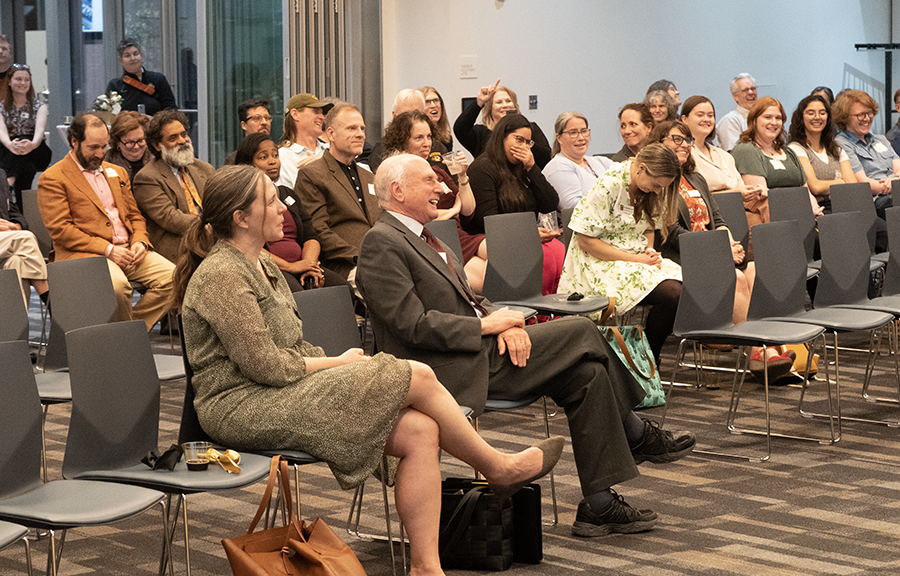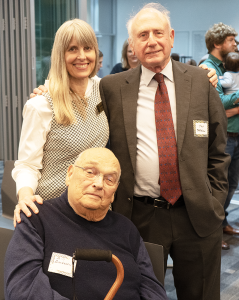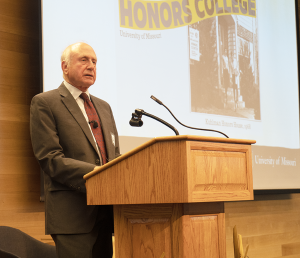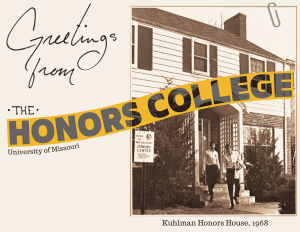Former director and long-time Honors College faculty Ted Tarkow shared many memories during the “Toast to Honors” celebration in November. Below are his remarks.

For me, “Honors” began in an old, run-down structure, with windows that never fully closed in any season, thereby allowing such air-conditioning and heating as might seem appropriate to be useless. The outside door facing Kuhlman Court did lock (after some good physical cajoling) but the one at the rear – the one that faced the antiseptic, windowless fortress known as the brand new Ag Building – never did.
Such glorious inefficiency … and such a metaphor for what began in 1958 and slowly grew into a place where bright, curious and nerdy students might learn from talented and passionate instructors. Courses were frequently interdisciplinary, which meant that they sometimes did, and sometimes did not, match the catalogue descriptions of what Mizzou courses should be. Some professors, for example, might offer a course that would help a student meet a humanities requirement … but wait … maybe it’s more like a social science … oops … nope, a behavioral science. The rigidity of curricular boundaries was under assault in a building that made more weird noises than a definition of “honors” might be.
Ah … yes … 612 Kuhlman Court. To this day, my go to password whenever I need one that I know I will remember! The creaky building’s oozing with inefficiency added fuel to the standard questions well-meaning administrators always asked, in addition to what degree requirements a particular course might satisfy: Who should teach an Honors course? An Honors section? Who decides? How, and by whom, should an “Honors something” be evaluated? Here’s an impossibly difficult question that rivaled counting the number of angels on the head of a pin: What department should get credit for the student credit hours generated? And one more: How was the Honors College a college? These were the neat dilemmas that plagued talented Honors College administrators, who thanks to their persistent prodding, got the upper administration to direct appropriate attention to teaching and learning and thus to allow inefficiency (and the impossibility of answering some of these questions) its own pride of place as Honors at Mizzou took on a life of its own. Rod McGrew, Mack Jones, Dick Renner, Bill Bondeson, George Fasel and I made rocking the walls of requirements and boundaries an art form.

So, too, did Ed Kaiser, a splendid colleague whose boundless commitment to Honors-level students helped scores make the most of their time at MU.
The building’s inefficiency was central to its charm. We really didn’t need fancy quarters. All we needed was a place to teach and to learn – stuff especially appropriate for the caliber of student we were privileged to have. And we made the old place work! Post Kuhlman Court directors – Stu Palonsky, Nancy West, J.D. Bowers and now Catherine Rymph – in their modern edifices – have done the same, now that 612 Kuhlman Court has travelled down to the Underworld, as desolate a place as the haunted basement of 612 itself.
Neat things abounded in this dump of a building, nestled on Kuhlman Court next to great neighbors in history, vocational education, soils and romance languages. There was also an Extension office that helped the agricultural communities of the state master weeds and feral hogs. This unique assortment of disciplines mirrored the mixture of people and activities in 612. Classes were held in the first-floor lounge, where coffee mingled with last holiday’s candy or last weekend’s honors potluck. Or the classes met in the classroom at the top of the squeaky stairs. With a table that must have been abandoned by Lewis and Clark on their way up the Missouri, the seminar-like classroom always generated such terrific discussions that the old building croaked with the excitement of learning, with the laughter of engagement with interesting material, with the unanticipated joys in learning with and from each other, and with the energizing combustion of understanding what it might take to make an idea, or a product, or a place or a situation better. Time and again classes went on longer than they should have, which meant that, hour after hour, the creaky stairs were dangerously full of 20-25 students going up and 20-25 going down the same staircase at the same time.

During the day, students came in steadily. First-gen freshmen, enjoying the “home-away-from-home” atmosphere; seniors, hoping to apply for a Rhodes or some other major fellowship; sophomores and juniors, doing all sorts of Mizzou things. All so optimistic, so ready for a long, or a quiet, conversation with friends, or staff or each other. Or needing to talk with someone. Or to work on knitting. Or to play a round of chess or bridge. Or to bitch and gripe. Or to peruse a magazine or a book that someone had dropped off. Coffee was available for a nickel and went well with the remnants of care packages sent by parents. Anytime a faculty or staff colleague came in that person was put to work talking with one or more of these students and helping do the work of the Honors College. There being no staff other than the director and the multi-talented Judy Hamilton or awesome Carol Trammel, all hands were on deck.
And there was no complaining. Lots of times we reflected at the end of a day on some of the questions we had fielded and discussed. Some, of course, were serious, and without satisfying answers.
On the other hand, some were really weird, as Honors students are especially prone to ask: What really are the 12 ways one can one make Raman noodles delicious? After all, KU students couldn’t get past 11. How can I learn how to change a flat tire faster than the other student from my high school friend up there in Macon? If I am “undecided”, but must now declare a major, can I shift to “pre-clarified?” Should I drop calculus, or not, thereby delaying, once again, any chance at maturation? And these two: What if Taylor Swift isn’t? But what if Travis Kelce is?
During the scores and scores of conversations we had with students, we reminded them that whatever their major or personal and career goals, their ultimate subject was the self. The glorious Socratic mandate “Know Thyself” became the goal of so much that we aimed for in the old rickety building. Taking advantage of what a college campus has always been – an open marketplace of ideas and exploration – was our goal. The “open campus” was such a change from the closed walls of their high schools that we wanted students to explore, physically and intellectually, everything that they could while they were here. No topics were off-limits; acceptance of and listening to others and their points of view was the rule and the norm.

The humor which nerdy students brought to all of us added to the thrill of working with them. Eventually, of course, they graduated and, as time passed, they reported (ordinarily at Christmas, with real cards) what they were doing: Becoming a docent and then curator at a major Museum; going off to New Zealand on a Fulbright before going to law School; becoming a teacher in an inner part of Kansas City; a reporter at a major news outlet in Minneapolis; the U.S. Ambassador to Malawi (just back to Mizzou earlier this week). With all that we had access to, we could have been the spark to create databases!!! Given all other wonderful inefficiencies, is anyone surprised that we didn’t? If something along these lines existed, it did so (haphazardly) in the director’s mind or on scattered pieces of note paper, eventually put into a box destined for the basement, a part of the building that must have gone back to the 19th Century – B.C.E.
To Dean Rymph and her staff: Not creating and maintaining a database of who our students were, what they did, and how they did it, this was a cardinal sin, worthy of another rung down there in Dante’s Inferno. It is a sin for which all of us early directors must ask forgiveness from our techy successors. I do add, however, that we take some comfort in knowing that no one else had thought of electronic records and databases. But darn it, our students had the smarts to have done so!! In any event, may you build databases that allow 50 years from now the story of the Honors College to be even more filled with stories of terrific teaching and learning.
The old building served MU well; 612 Kuhlman Court is now down there in the Underworld, enjoying afterlife alongside Homer, Dante, Shakespeare, Adam Smith, Michelangelo, Jane Austin, Richard Feynman, Toni Morrison, Groucho Marx, John Lennon and Yogi Berra. Modern students want and deserve new learning environments … but with care and with creative uses of resources our Mizzou Chancellor and Provost are now putting into the Honors College, the spirit of the old place will continue to shine, as new students, with the help of new and committed faculty and staff, continue to “Know Thyself.” And since knowing thyself always involves lots of mistakes and mis-turns, let us hope that Mizzou’s 21st century Honors College continues to relish and support periodic, and maybe intentional, inefficiencies and inconveniences, thereby maintaining the spirit of the old “home away from home.” M I Z – KUHLMAN COURT. MIZ – HONORS NOW.